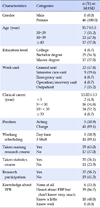Abstract
Purpose
Today's clinical nurses deal with complex problems that need accurate evidence for practice and decision making. In this study the effectiveness of an EBP education program was examined.
Methods
A pre-posttest design was used for this study and participants were 46 nurses working at a tertiary hospital located in Suwon, Korea. Date collection was done before and after the education program, from July 27 to October 2, 2015. Data were analyzed using paired t-test and ANCOVA with SPSS 21.0.
Results
There were significant differences in scores before and after the EBP education program for EBP readiness: belief (t=-5.65, p<.001), implementation(t=-2.89, p=.006), competence (t=-4.21, p<.001), and for evidence-based decision making (t=-16.25, p<.001) by the nurses.
Conclusion
The findings indicate that the EBP education program has positive effects on EBP belief, implementation, competence and evidence-based decision making. In the future, it is necessary to reinforce the content of the program in the clinical workplace and to provide continuous education for clinical nurses.
Figures and Tables
References
1. Lee YJ. Development of a competency model for evidence based nursing practice [dissertation]. Seoul: Yonsei University;2013.
2. Sackett DL, Straus SE, Richardson WS, Rogenberg WM, Haynes RB. Evidence based medicine: How to practice and teach EBM. 2nd ed. Churchill, London: Livingstone;2000.
3. Rizzuto C, Bostrom J, Suter WN, Chenitz WC. Predictors of nurses' involvement in research activities. West J Nurs Res. 1994; 16(2):193–204. DOI: 10.1177/019394599401600206.
4. Choe MA, Bang KS, Park YH, Kang HJ. Current status and direction for future development of evidence-based nursing in Korea. Perspect Nurs Sci. 2011; 8(2):129–138.
5. Cho MS, Cho YA, Song MR, Kim MK, Cha SK. Development of a program to facilitate evidence-based practice based on the transtheoretical model. Korean J Adult Nurs. 2013; 25(2):136–147. DOI: 10.7475/kjan.2013.25.2.136.
6. Brown CE, Wickline MA, Ecoff L, Glaser D. Nursing practice, knowledge, attitudes and perceived barriers to evidence based practice at an academic medical center. J Adv Nurs. 2009; 65(2):371–381. DOI: 10.1111/j.1365-2648.2008.04878.x.
7. Thiel L, Ghosh Y. Determining registered nurses' readiness for evidence-based practice. Worldviews Evid Based Nurs. 2008; 5(4):182–192. DOI: 10.1111/j.1741-6787.2008.00137.x.
8. Reigle BS, Stevens KR, Belcher JV, Huth MM, McGuire E, Mals D, et al. Evidence-based practice and the road to magnet status. J Nurs Adm. 2008; 38(2):97–102. DOI: 10.1097/01.NNA.0000310715.07850.b8.
9. Kim JS, Gu MO, Jo SY. Factors influencing evidence-based practice readiness for tertiary general hospital nurses. J Korea Acad Ind Coop Soc. 2013; 14(6):2945–2957. DOI: 10.5762/kais.2013.14.6.2945.
10. Gu MO, Jo YA, Eun Y, Jung IS, Lee SH, Seo HJ. Introduction to evidence-based nursing. Seoul: Fornurse;2016.
11. Sherriff KL, Wallis M, Chaboyer W. Nurses' attitudes to and perceptions of knowledge and skills regarding evidence based practice. Int J Nurs Pract. 2007; 13(6):363–369. DOI: 10.1111/j.1440-172x.2007.00651.x.
12. Koehn ML, Lehman K. Nurses' perceptions of evidence based nursing practice. J Adv Nurs. 2008; 62(2):209–215. DOI: 10.1111/j.1365-2648.2007.04589.x.
13. Estrada N. Exploring perceptions of a learning organization by RNs and relationship to EBP beliefs and implementation in the acute care setting. Worldviews Evid Based Nurs. 2009; 6(4):200–209. DOI: 10.1111/j.1741-6787.2009.00161.x.
14. Ferguson LM, Day RA. Supporting new nurses in evidence-based practice. J Nurs Adm. 2004; 34(11):490–492.
15. Melnyk BM, Fineout Overholt E, Mays MZ. The evidence based practice beliefs and implementation scales: Psychometric properties of two new instruments. Worldviews Evid Based Nurs. 2008; 5(4):208–216. DOI: 10.1111/j.1741-6787.2008.00126.x.
16. Hart P, Eaton L, Buckner M, Morrow BN, Barrett DT, Fraser DD, et al. Effectiveness of a computer based educational program on nurses' knowledge, attitude, and skill level related to evidence based practice. Worldviews Evid Based Nurs. 2008; 5(2):75–84. DOI: 10.1111/j.1741-6787.2008.00123.x.
17. Winters CA, Echeverri R. Teaching strategies to support evidence-based practice. Crit Care Nurse. 2012; 32(3):49–54. DOI: 10.4037/ccn2012159.
18. Cho MS, Song MR, Cha SK. Nurses' perceptions regarding evidence-based practice facilitators in a tertiary hospital. J Korean Acad Fundam Nurs. 2011; 18(3):300–309.
19. Park H, Jang K. Structural model of evidence-based practice implementation among clinical nurses. J Korean Acad Nurs. 2016; 46(5):697–709. DOI: 10.4040/jkan.2016.46.5.697.
20. Yi J, Park MH. Nurses' access & use of information resources and barriers & competency of evidence based practice. Korean J Adult Nurs. 2011; 23(3):255–266.
21. Lim KC, Park KO, Kwon JS, Jeong JS, Choe MA, Kim JH, et al. Registered nurses' knowledge, attitudes, and practice about evidence-based practice at general hospitals in Korea. J Korean Clin Nurs Res. 2011; 17(3):375–387.
22. Park MH. Effects of evidence based practice integrated critical care clinical practicum. J Korean Acad Soc Nurs Educ. 2011; 17(3):346–354. DOI: 10.5977/jkasne.2011.17.3.346.
23. Park M. Implementation of evidence based nursing education into nursing management clinical practicum: Outcome evaluation and diffusion strategies. J Korean Acad Nurs Adm. 2013; 19(1):39–47. DOI: 10.11111/jkana.2013.19.1.39.
24. Oh EG, Kim S, Kim SS, Kim S, Cho EY, Yoo JS, et al. Integrating evidence-based practice into RN-to-BSN clinical nursing education. J Nurs Educ. 2010; 49(7):387–392. DOI: 10.3928/01484834-20100331-02.
25. Sim JY. The effect and education program development for evidence-based practice implementation of clinical nurse [dissertation]. Gwangju: Chonnam National University;2014.
26. Thompson C, Cullum N, McCaughan D, Sheldon T, Raynor P. Nurses, information use, and clinical decision making-the real world potential for evidence-based decisions in nursing. Evid Based Nurs. 2004; 7(3):68–72. DOI: 10.1136/ebn.7.3.68.
27. Jang IS, Park MH. Knowledge management, beliefs, and competence on evidence-based practice, evidence-based decision making of nurses in general hospitals. Korean J Adult Nurs. 2016; 28(1):83–94. DOI: 10.7475/kjan.2016.28.1.83.
28. Ilic D. Teaching evidence-based practice: perspectives from the undergraduate and post-graduate viewpoint. Ann Acad Med Singapore. 2009; 38(6):559–563.
29. DiCenso A, Cullum N, Ciliska D. Implementing evidencebased nursing: Some misconceptions. Evid Based Nurs. 1998; (2):38–39. DOI: 10.1136/ebn.1.2.38.
30. Bahtsevani C, Willman A, Khalaf A, Östman M. Developing an instrument for evaluating implementation of clinical practice guidelines: A test retest study. J Eval Clin Pract. 2008; 14(5):839–846. DOI: 10.1111/j.1365-2753.2007.00916.x.




 PDF
PDF ePub
ePub Citation
Citation Print
Print






 XML Download
XML Download